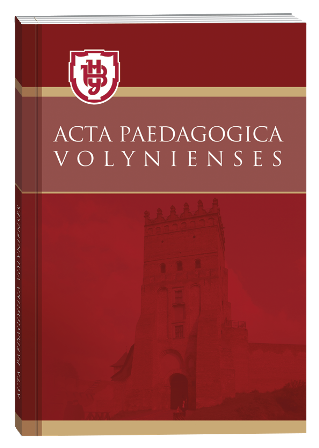EDUCATIONAL PRINCIPLES OF PATRIOT PERSONALITY DEVELOPMENT UKRAINE
DOI:
https://doi.org/10.32782/apv/2023.3.12Keywords:
patriotic education, personality, preschool and general secondary education institutions, development.Abstract
In the article, patriotism appears as a quality in the personality structure, which includes the need to faithfully serve one's Motherland, to show a sense of love and loyalty to it, to realize and experience its majesty and glory, one's spiritual connection with it, to respect and protect its honor and dignity, to strengthen its power. It was determined that when using the rational factor, the formation and development of students' spiritual and moral potential should be carried out in the following directions: involving students in art and various types of creative activities; development of the visual and emotional sphere of young people in everyday life; assessment and self-assessment of the level of development of knowledge, abilities, and skills that the student acquires when studying academic disciplines. Several key directions of patriotic education are highlighted: increasing the interest of young people in issues of patriotic education based on historical memory and the succession of generations; the use of means and methods of physical culture that have a military-applied orientation. It was determined that the culture of patriotism can be considered not only as a means of updating the content of pedagogical education, but also as a mechanism for bringing it into line with the requirements of the time. It was established that the culture of patriotism allows to more concretely determine the logic of development of knowledge and skills that are significant in patriotic education, corresponding to the concept of a competent personality in the modern world. It has been proven that the formation of the worldview and patriotic positions of the teacher, which represent a complex of views on the world, oneself, other people, attitude to the changes taking place in society and the state, attitude to one's profession, to one's inner state, is of great importance. All these parameters are reflected both in the educational process and, ultimately, in the formation of the patriotic self-awareness of each student's personality. This means that it is the culture of patriotism as one of the basic values of the teacher that determines the choice of means and methods of patriotic education. It was revealed that mastering the culture of patriotism, as a fundamental component of the teacher's professionalism, is a mechanism for creating a qualitatively new model of a teacher of additional education for children.
References
Стех Є. О. Патріотичне виховання учнівської молоді в професійно-технічних навчальних закладах : автореф. дис. ... канд. пед. наук : спец. 13.00.07 «Теорія і методика виховання». Нац. пед. ун-т імені М. П. Драгоманова. Київ, 2014. 23 с.
Стрілько В. Українське національно-патріотичне виховання в нормативно-правових актах України. Гуманітарний вісник ДВНЗ «Переяслав-Хмельниц. держ. пед. ун-т імені Григорія Сковороди» : наук.-теор. зб. 2014. Вип. 33. С. 155–168.
Стьопіна О. Патріотичне виховання: теорія та практика. Шкільний світ. 2007. № 42. С. 6–8.
Тимошенко О. Метод проектів як складова частина національнопатріотичного виховання. Директор школи, 2008. № 8. С. 10.
Ткаченко В. Патріотизм. Енциклопедія освіти. Акад. пед.. наук України. Київ : Юрінком Інтер, 2008. С. 633–634.
Шинкаренко В. В., Клімова Л. В., Виноградова О. М., Писарєва Л. В. Патріотичне виховання дітей та учнівської молоді на матеріалах етнохудожньої культури. «Інноваційна педагогіка» : науковий журнал Причорноморського науково-дослідного інституту економіки та інновацій. 2020. Вип. 30. Том 2, С. 98–101.







